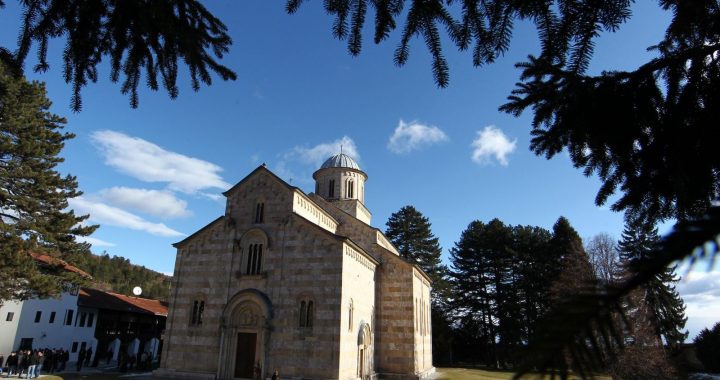

 The Serbian Orthodox Visoki Decani Monastery in Kosovo, January 2013. Photo: EPA-EFE/Valdrin Xhemaj.
The Serbian Orthodox Visoki Decani Monastery in Kosovo, January 2013. Photo: EPA-EFE/Valdrin Xhemaj.
The status of the Serbian Orthodox Church in Kosovo is one of the most controversial articles in the Franco-German plan in the dialogue between Kosovo and Serbia. Experts declare that Kosovo should form the law for registration of religious communities.
Monday’s meeting in Brussels between Kosovo and Serbia leaders resulted without any signatures on the EU Plan.
One of the most disputed elements of this plan remains the status of the Serbian Orthodox Church in Kosovo.
Article seven of the EU Proposal states: “The Parties shall formalize the status of the Serbian Orthodox Church in Kosovo and afford a strong level of protection to the Serbian religious and cultural heritage sites, in line with existing European models.”
On Kallxo Përnime’ Tuesday, the former judge of the Constitutional Court in Kosovo, Gjylijeta Mushkolaj, said that the official formalism of the Orthodox Church in Kosovo has been a taboo subject for every government.
“The legal position of the Church is a taboo topic here in Kosovo and the problem of every government since the declaration of independence. It is the reluctance of every government to form the law for the registration and operation of religious communities in Kosovo. I believe that this government will have the courage to do it” – Mushkolaj declared.
According to the former judge, Kosovo operates with a law from the 80s regarding the status of religious communities.
“Other countries have advanced in this direction while we do not have the courage to break the monopolies of the 5 religious communities in Kosovo. The European Commission sees this as if we are not allowing formalization, we are not allowing them to register” – she further added.
In a plenary session on February 23th the Prime Minister of Kosovo, Albin Kurti, said that formalization does not mean special rights for the Orthodox Church.
“Formalization does not mean negotiation on the status of the Church, nor discussion on special rights. Formalization references a legal religious community in the internal legislation of Kosovo” – said Kurti.
Kurti further added that this means the fulfillment of Kosovo’s obligation to all communities or religious communities.
“I can guarantee you that nothing special or historically controversial that has to do with the Orthodox Church would be included in an agreement like this,” he emphasized.
Meanwhile on Tuesday, Violeta Haxholli from the Kosovo Democratic Institute, KDI stated that the inclusion of article 7 relates to the fact that Kosovo has not fulfilled obligations issued by the Constitutional Court regarding the property claims of Deçan Monastery and that this has damaged Kosovo in terms of good faith between Kosovo institutions and the Serbian community.
Since the end of the war of 1998-99 in Kosovo, the Deçan Monastery, which is located in the western part of the country, has been demanding ownership of an area of about 24 hectares. The ownership was confirmed by the Constitutional Court in May 2016.
However, the local authorities in Deçan have not implemented this decision, claiming that the area was taken by force in the 90s, by the regime of the then Serbian leader, Slobodan Milosevic.
03 March 2023 - 21:35

Nine offices run by the Serbian national postal service Posta Srbije w...

On the first anniversary of violent protests in Serb-dominated norther...

Serbia has not explained why Dejan Jankovic was arrested on Wednesday,...

Report by rapporteur Dora Bakoyannis advises positive response to Koso...
Lorem ipsum dolor sit amet, consectetur adipisicing elit. Optio, possimus obcaecati repellendus minus ut voluptatum laboriosam, neque fuga velit! Asperiores sint facere accusamus. Enim, omnis vero magnam beatae tenetur, et, architecto aliquid neque facilis itaque doloremque maxime sit. Alias sapiente ab odio corrupti reprehenderit beatae eius quis tempora, perspiciatis obcaecati culpa debitis molestias, officiis, nulla iste delectus tenetur sunt dolorem ea perferendis laboriosam, praesentium voluptatibus velit atque sint. Eligendi deserunt fugiat molestiae ex, animi, libero asperiores quis perferendis vero quibusdam, inventore dicta optio minus fuga reprehenderit officia quas dolorum error amet aliquid. Aut, non mollitia, corrupti nesciunt fuga vel hic.